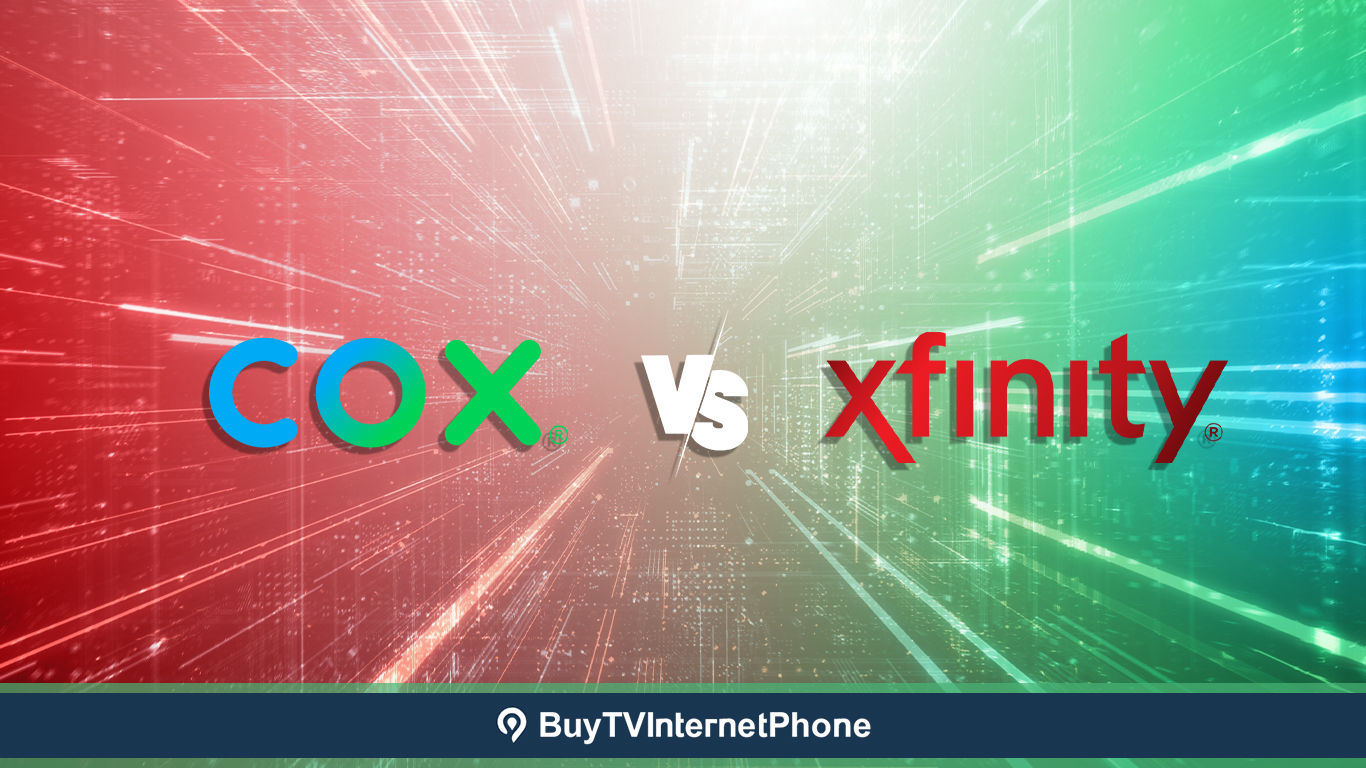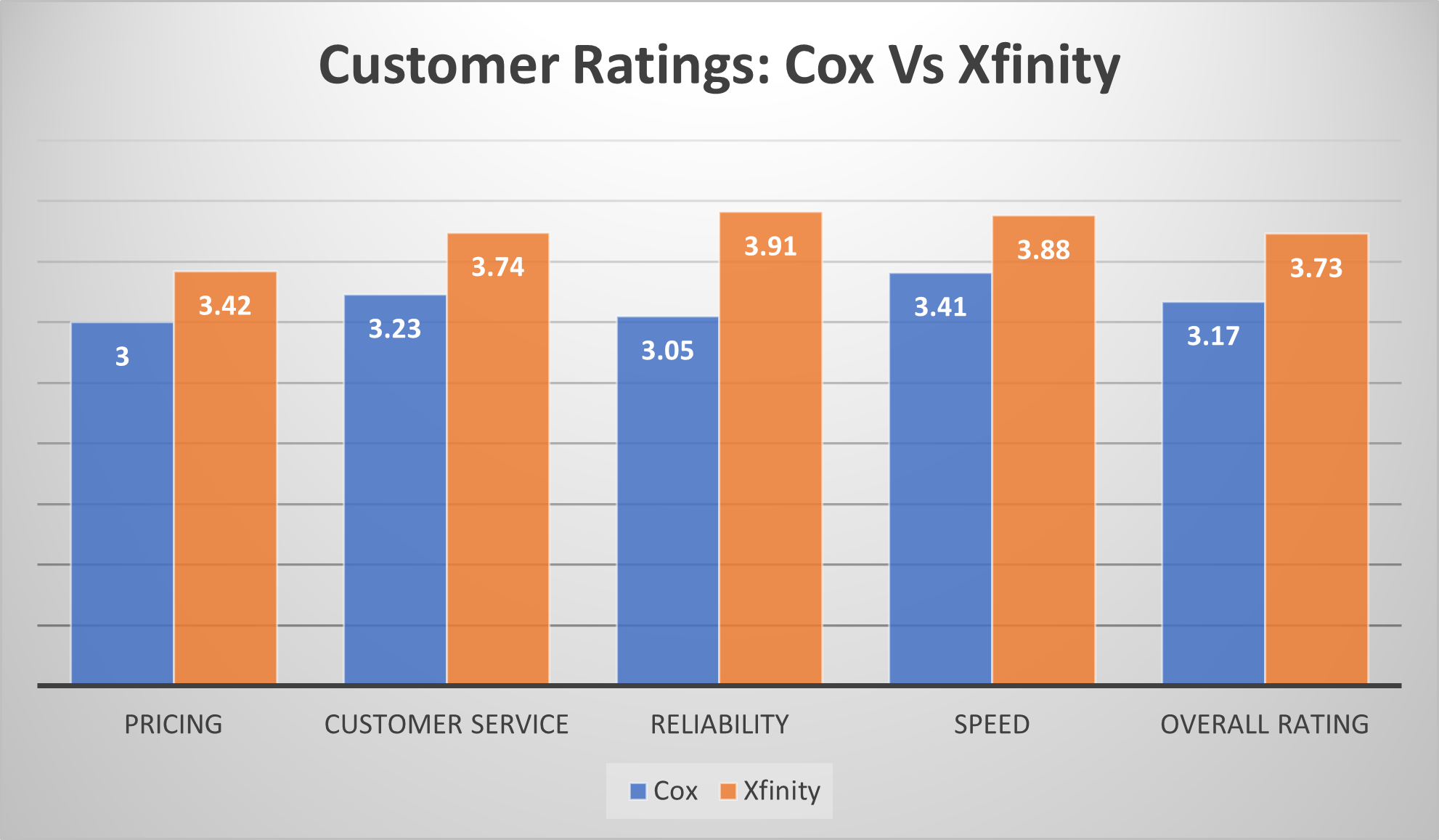
BuyTVInternetPhone is your trusted guide to home connectivity. We may make money when you buy through our links, at no extra cost to you.
Cox and Xfinity are two strong contenders in the race for the best broadband internet service. Comparing both providers highlights their similarities, but also draws attention to the points that set them apart.
Let’s take a sneak peek at what Cox Internet and Xfinity Internet have in store:
Before we dive into details, let’s cover the basic pros and cons of choosing either of the two internet options.
 |
 |
|---|---|
|
PROS
|
PROS
|
|
CONS
|
CONS
|
Both Cox and Xfinity offer a versatile range of internet plans to meet different user needs. However, Xfinity gives more variety and value; not to mention, the prices are quite pocket-friendly.
On the contrary, Cox offers better upload speeds across all plans, and the pricing is more clear-cut. Here’s a comprehensive layout of internet plans offered by the two contenders.
Go Faster
$50/mo.
For 1 Year
Go Even Faster
$80/mo.
For 1 Year
Go Super Fast
$110/mo.
For 1 Year
Go Beyond Fast
$150/mo.
Everyday Price
| Speed Tier | Download Speeds Up to | xFi Advanced Security | |
|---|---|---|---|
| 300 Mbps | 300 Mbps | Included with xFi Gateway | View Plans |
| 500 Mbps | 500 Mbps | Included with xFi Gateway | View Plans |
| 1 Gig | 1000 Mbps | Included with xFi Gateway | View Plans |
| 2 Gig (1.2 Gig) | 2000 Mbps (in select markets) | Included with xFi Gateway | View Plans |
Includes 1-Year and 5-Year price guarantee. Prices, speeds, and package availability may vary from area to area.
**For 24 month, no term contract. Taxes not included. Incl. up to $10/mo. auto-pay & paperless bill discount.
P.S: Prices, speeds, and package availability may vary from area to area.
Being among the leading cable internet providers in the United States, Xfinity and Cox naturally have an extensive network.
Xfinity provides internet services to cities and towns across 41 states with the most impressive footprint in California, Florida, and Illinois. In fact, it is the largest cable internet provider, owning about 40% of the market share and serving more than 32 million customers.
Cox extends network coverage to 18 states and delivers internet services to more than 3 million subscribers. The Cox footprint is particularly concentrated in Arkansas, Arizona, and California.
When comparing two internet service providers (ISPs), it makes sense to find out what other people like you are saying about them. Nobody can offer a better opinion than an existing or former customer after all.
Our key findings based on customer reviews:

P.S: All scores correspond to a maximum rating of 5
Both Xfinity and Cox provide high-speed cable broadband to the residential sector using lines in combination with a fiber-based backbone. This creates a hybrid network that delivers greater bandwidth and yields speeds up to 1-2 Gbps.
Cox and Xfinity also provide fiber internet in select areas; a true fiber connection to your home provides symmetrical upload and download speeds.
When it comes to data caps, Xfinity and Cox are definitely well-matched. None of the two offer unlimited data, which means you’d have to pay an overage fee if you exceed the limit.

That said, each of the providers offers a generous data allowance: Xfinity gives you 1.2 TB of data per month and Cox gives you slightly more, i.e. 1.25 TB. The average household in the US consumes 600-700 GB of data per month, so the chances of exhausting the data caps imposed by Cox and Xfinity are low.
Nonetheless, if you do go over the data limit, the overage charge is typically $10 for every 50 GB block of data used in excess.
Cox does not require customers to enter any term contract. You pay for your internet plan on a monthly basis, so you can call quits or switch to another service anytime without consequences. If you decide to keep using the service after a year, your internet plan will be subject to an annual price rise.
Xfinity offers customers the choice to go for a no-contract plan or one with a 1 to 2-year term agreement. Choosing a contract plan lets you avail of a low promotional price for the duration of the agreement.

To enjoy the freedom of month-to-month payment, you’ll have to forgo Xfinity’s promotional discount rate and pay a higher price. In the case of a contract, you are liable to pay an early termination fee if you cancel the service before the term ends.
Cox charges $100 for professional internet installation. Self-installation is also an option if you’re up for the task; the DIY approach will save you money as it is free of charge. When you choose the DIY route, Cox will ship you a self-installation kit (shipping charges may apply); you could also pick up the kit from their nearest store.
Xfinity's internet installation system is almost identical to that of Cox. A $100 fee is charged for professional installation, and the self-install kit requires a $15 shipping fee (which can be skipped if you pick it yourself).
When purchasing an internet plan, certain additional or hidden charges must be taken into consideration. Reviewing the fine print is encouraged so that you’re not surprised (in a bad way) when your internet bill arrives.
|
Miscellaneous Charges |
Cox |
Xfinity |
|
Equipment (modem + router/gateway) Rental |
$13/month |
$15/month |
|
Service Activation Fee (one-time) |
$25 |
Not Applicable |
|
Government Taxes |
Vary by location |
Vary by location |
|
Late Fee |
1.5% (per month) |
$10 |
|
Early Termination Fee |
Not Applicable |
$10 for every month remaining in the contract |
Now that all the necessary information has been laid out, we hope that picking the right internet provider for your home will be a hassle-free experience.
Both Cox and Xfinity provide top-notch internet services, so it all comes down to the finer details. All in all, Xfinity Internet takes the lead in terms of availability and affordability. In contrast, Cox takes the win if you prefer transparency; the straightforward pricing and contract-free plans are indeed convenient.
The speed you get depends on your chosen internet plan. Xfinity offers download speeds up to 1200 Mbps, whereas Cox offers download speeds up to 2000 Mbps; thus, in a way, Cox can be considered faster.
Xfinity Internet plans offer better value for your money overall, but Cox excels in other departments like price transparency.